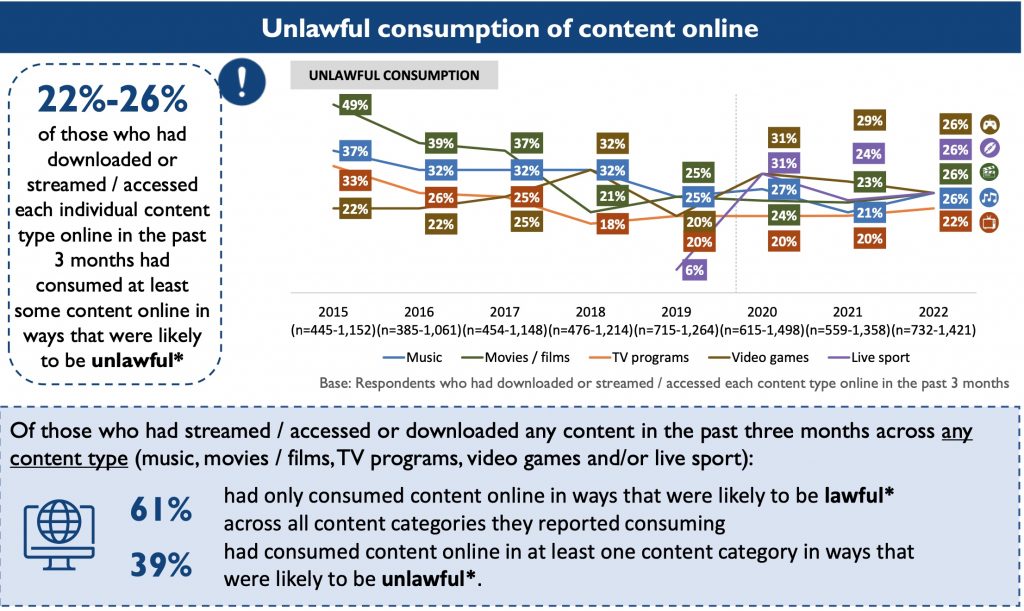In Australia, copyright is governed by the Copyright Act 1968, which is administered by the Attorney-General’s Department; and grants copyright owners with exclusive rights to publish, copy, perform, adapt and rent their materials. Copyright may be infringed by downloading music, TV shows or movies from the internet, photocopying a book, or making a recording of a live performance, without permission and/or paying to do so.
In addition, the Copyright Act also allows copyright owners to take legal action against someone who does things to circumvent technological protection measures (technical tools designed to prevent copyright infringement, such as IP blocking based on location) used to protect their material without being able to rely on a relevant exception.
Focus on digital piracy
The Attorney-General’s office published an Issues Paper in December 2022, with a particular focus on digital platforms and piracy. “The department is aware that there are new and emerging technologies that may be changing the way people access content online (including infringing content). The use and effect of these technologies needs to be better understood and considered further, including as part of this review,” the Government said.
Research published in February 2023 by the Australian government found piracy of film and television content trending downward between 2015 and 2019, relatively flat through 2021, and rising in 2022. The only category that declined was video games.

Open questions
Questions being asked by this review process include:
- What challenges have you been facing in relation to copyright infringement in recent years? Are you seeing any changes or trends; new forms or methods of infringement?
- What is the scale of current copyright infringement, or the estimated economic impact on you, your organisation or your industry more broadly?
- Are there any particular drivers of copyright infringement that you see as noteworthy or significant? Have these drivers changed in recent years?
- Are the currently available commercial or industry-led mechanisms appropriate, and/or being appropriately used, to address or prevent actual or potential copyright infringement. Do the costs outweigh the benefits?
- Are the current website blocking schemes effective as ways to combat copyright infringement and are they steering online consumers towards legitimate sources of content, and how could they be improved?
- How effectively and efficiently are the authorisation liability provisions and/or safe harbour scheme (and associated notice and take-down process) currently operating as mechanisms for addressing copyright infringement, and can they be made more effective?
- What actions do you take through the legal system and/or law enforcement to address copyright infringement and have they been suitable and effective? What factors influence your decisions on what actions to take?
Read the Copyright Enforcement Review Issues Paper. Attorney-General’s office, Government of Australia
The Attorney-General’s 2022 report on copyright infringement in Australia was released on February 10, 2023. Annual Consumer Surveys on Online Copyright Infringement, Australian Government, Attorney-General’s Office
Read an analysis by a prominent Australian law firm: The Copyright Enforcement Review: what you need to know about the latest inquiry into Australian copyright law. By Allens Linklaters. December 21, 2022.
Why it matters
According to the Issues Paper, Copyright owners seeking to enforce their copyright against such unauthorised uses can face significant time, resource and financial costs in monitoring for infringement and pursuing legal action against alleged infringers. Responding to an allegation of copyright infringement is also likely to give rise to similar barriers and costs.
Hence, the government is undertaking this review to understand current and emerging enforcement priorities and challenges, gather views from all parts of the copyright system – including owners, users, institutions and service providers – on whether Australia’s copyright enforcement regime remains relevant, effective and proportionate. The Government is also seeking feedback on whether there is any need to supplement or strengthen existing enforcement mechanisms, and if so, how this could be done without imposing unreasonable administrative or economic burdens.












